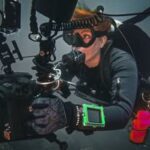Last Updated on January 22, 2025 by Candice Landau
I’m a PADI scuba diving instructor. I’m also a NAUI/AAUS Scientific Diver, a TDI Tech Diver, have done my GUE fundies, and am an NSS-CDS/TDI Intro to Cave diver. Needless to say, I’m a hodge podge of agency knowledge.
Each of these agencies has both pros and cons. For example, where PADI makes diving accessible to many people, it does not put as much emphasis on improving diving technique, or on gas planning (unless you get an instructor that does this because they’ve taken courses with other agencies that do). And, where GUE helps a diver dial in technique, buoyancy, and team-diving procedures, it does not allow for as much flexibility in equipment configuration, where another method may sometimes be better. Of course, there are reasons for all of these things.

Unfortunately, much of the scuba diving industry is set up to pit one organization against another. This is perpetuated by dive shops, professionals, and organizations. From a purely capitalist perspective, it makes sense. You want your members to take the next class with you, and not the other organization. After all, your organization can only stay alive if the money is rolling in. That’s just a fact.
>> Related Reading: Abort: When Not Diving is the Best Option
From a learning, safety, and personal improvement perspective, this attitude is, however, almost anti-intellectual. No single organization has all the answers. Some adopt dive safety findings faster than others in one facet, others adopt it better or faster in another facet. Some will stress safety checks, others will drill you on in-water skills more rigorously. Some will offer better materials for learning and teaching, others will offer more flexibility with materials. In reality, they’re all feeding off of each other and will all learn from one another as time moves ever forward.

Until you’ve taken a smorgasbord of courses from different organizations, you don’t really have all the facts. It’s like expecting to learn everything you can about different cultures when you never travel.
My biggest leap in learning began when I signed up for a NAUI/AAUS Scientific Diving course. Why? Because Oregon State University, and my instructor, Kevin Len Buch, required intensive dive planning before every dive. This made us think much more about our dive plan, and our team’s capabilities and limitations. This course also stressed the importance of performing skills in mid-water—rather than while kneeling—and operating while task-loaded. Kevin had a number of little tools and puzzles we had to complete while maintaining excellent buoyancy and trim.

A couple of months later, when I took a TDI Deco Procedures course, I learned the value of planning for dives where I might lose access to one of my deco gasses. I also learned more about diving with mixed gasses, including the advantages and limitations. This opened my eyes to new options, and opened them to risks of accepting a gas (trimix, for example) I might never have been certified to use for a dive.
>> Related Reading: Scuba Professionals Should Cultivate a Learning Midnset
This applies to dive courses that don’t result in a certification too. For example, I’ve taken courses so I can learn to dive the Oregon Coast Aquarium. I’ve taken courses so I can be part of the Oregon Marine Reserves dive survey team. I’ve taken courses so that I can participate on underwater archaeology dives with the Maritime Archaeological Society. Not everything that’s worth doing has to result in a certification card.
All this is to say don’t become stagnant, or allow politics to get in the way of personal progress. Keep learning. This isn’t just how you progress, it’s also how the different organizations will progress as you bring in fresh ideas and perspectives (recall those days when PADI called nitrox voodoo gas? Guess what…today Enriched Air Nitrox is one of the organization’s best selling certifications). But really, at the heart of it all, the more you know, the safer you will be.

















